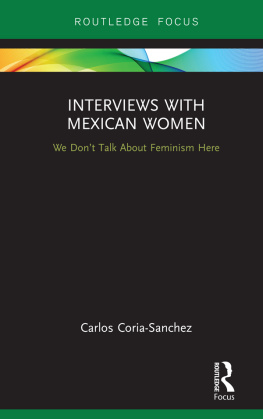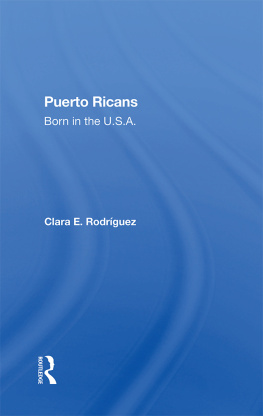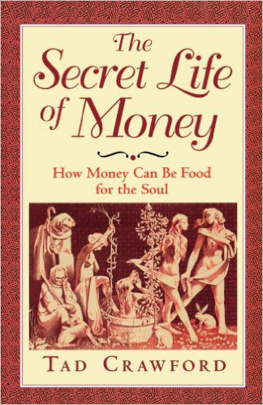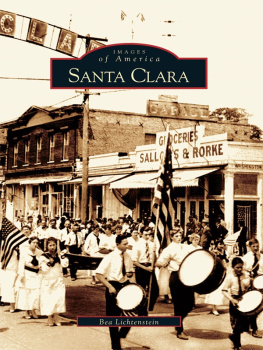Clara Coria
THE SECRET SEX
OF
MONEY
Forms of female dependence
ANDROGYNOUS 21
Credits
Clara Coria
First published in Argentina in 1986
Original title:
El sexo oculto del dinero
Formas de la dependencia femenina
First published in English with the title:
The secret sex of money
Forms of female dependence
Red Ediciones S.L., 2014
English translation copyright Mark Lodge
Editor: Henry Odell -
Cover design: Pensdromo
ISBN: 978-84-942474-5-3 (paper)
ISBN: 978-84-942474-6-0 (e-book)
This book is sold subject to the condition that it shall not, by way of trade or otherwise, be lent, re-sold, hired out or otherwise circulated without the publishers prior consent in any form of binding or cover other than that in which it is published and without a similar condition including this condition being impose on the subsequent purchaser.
Work published under the Sur Support Program to Translations of the Ministry of Foreign Affairs, International Trade and Worship of the Argentine Republic.
Obra editada en el marco del Programa Sur de Apoyo a las Traducciones del Ministerio de Relaciones Exteriores, Comercio Internacional y Culto de la Repblica Argentina.
Table of Content
Editors prologue
25 years have passed, indeed, and during this time, the evolution of society seems to have become increasingly bent on money as the leitmotiv for our existences and, along with it despite the efforts in changing attitudes its control over the relationships between people, both in the public and private realms, has been reinforced.
What leads a publisher to publish a book 25 years after the date of its first publication, with approximately ten editions and reprints (in Spanish) since then, and to publish it in English for the first time?
We have decided to publish this book by Clara Coria both in print and e-book format because we believe that the main thrusts of her analysis are still amazingly pertinent. Her premises on the subject are still indispensable for all who are willing to rethink and critically analyze the role they play in the context of their family and society as a whole.
The dawn of the 21st century brought with it the loss of certainties, the decline of the great collective projects with the crisis of previous utopias (both for Left and the Right) and the birth of new ways of seeing the world. A focus geared towards the personal level, social and economic success, dominates current society, which is immersed in a deep crisis. In answer to this, different voices, from men and women, rise up to speak about the need to reclaim the essential values of the human being. Our prevailing culture has allowed for the emergence of a new model of man and woman that implies a break with the traditional model. The book by Clara Coria we present to you is, precisely, one of the parts contributing to the emergence of this new model.
These contents need to be read with an open mind, a sincere and self-critical attitude and a willingness to take up the difficult task of questioning oneself and shaking deep-rooted certainties in our way of life.
We are publishing this book as a part of a corpus we have decided to call Androginias 21, a system of related published materials from which to promote the voices of men and women who advocate a greater balance between the feminine and the masculine in modern society.
And we publish it in the context of what we call Edition 21: an edition, today, in the new scenarios, editing books, but not only books. Latest-generation books, compatible with any electronic reading devices, yes, but not only as products, but also as axes for an advanced editorial service project, to analyze and study subjects, coordinated online by reputed professionals, in order to delve into other paths and to resolve new contents related to the treated subjects.
We hope that both this book and its proposal interest you.
For more information, you may write to us at the following e-mail address:
Henry Odell
As a prologue Love, money and power in a couple:
a gender-based perspective to learn
how to enjoy living together
The four key words in the title: love, money, power and couple, are, in themselves, exciting, worrying, opaque, challenging and revealing. These four nouns are the basis for the mystery of the lives of most people who have lived in the realm of Western Judeo-Christian culture and who have incorporated its principles, its ways of understanding life and, especially, the power model established between genders.
Exciting, because they pull the vital strings of exchanges between people. And all that is vital is also exciting. That is, it stimulates our greatest conscious and unconscious desires. It makes our hair stand on end, our muscles twitch, our pulse accelerate and our imagination soar. And we feel like Icarus, flying towards the sun.
Worrying, because in spite of the possible certainties some people believe they have, we are never sure of whether love, money, power and couple are what we believe they are or what we were taught they should be. Uncertainty looms at the most unexpected junctures of life, shaking the foundations we believed sustained our present and future projects. And uncertainty is worrying because, in our culture, it has been relegated to a secondary status, it has a bad reputation and it usually lacks the psychological space required to deal with it without fear. Fear of the unknown is emphasized whereas enthusiasm towards novelty and adventure are concealed.
Opaque because the apparently unambiguous and common concepts in which the words of this title are presented conceal, beneath their seemingly harmless appearance, infinite unspecified expectations, unspeakable ambitions and codes whose incompatibility is only discovered in practice. That is, when the moment comes to manage money, to take up the responsibilities of power, to share life as a couple attempting to harmonize the inevitable differences and, especially, when attempting to find and unravel the great mystery of love.
Love, money, power and couple are words that are difficult and, therefore, revealing. These concepts we carry along in our everyday lives, as we do with our personal history, cultural traditions or gender identity. They behave so naturally that they end up being obvious and, therefore, unnoticed by all. For instance: men and women tend to find it natural that emotional restraint is a feminine prerogative and that protection is a masculine obligation. In practical everyday life we can see that neither emotional restraint nor protection is universal and certainly not exclusive of either gender. Love, money, power and couple are not innocuous concepts, because the way in which we conceive them conditions our life and our environment irrevocably. It is important to keep in mind that these conditionings condition our future at all times. It is worth pointing out that, on this subject, it is often difficult to reveal even that which is not hidden, simply because the manner of understanding the concepts of couple, money, power and love have become naturalized. And sometimes, the hardest thing is to see what is before our very eyes because our outlook is limited by the prejudices we uphold disguised as natural certainties.











